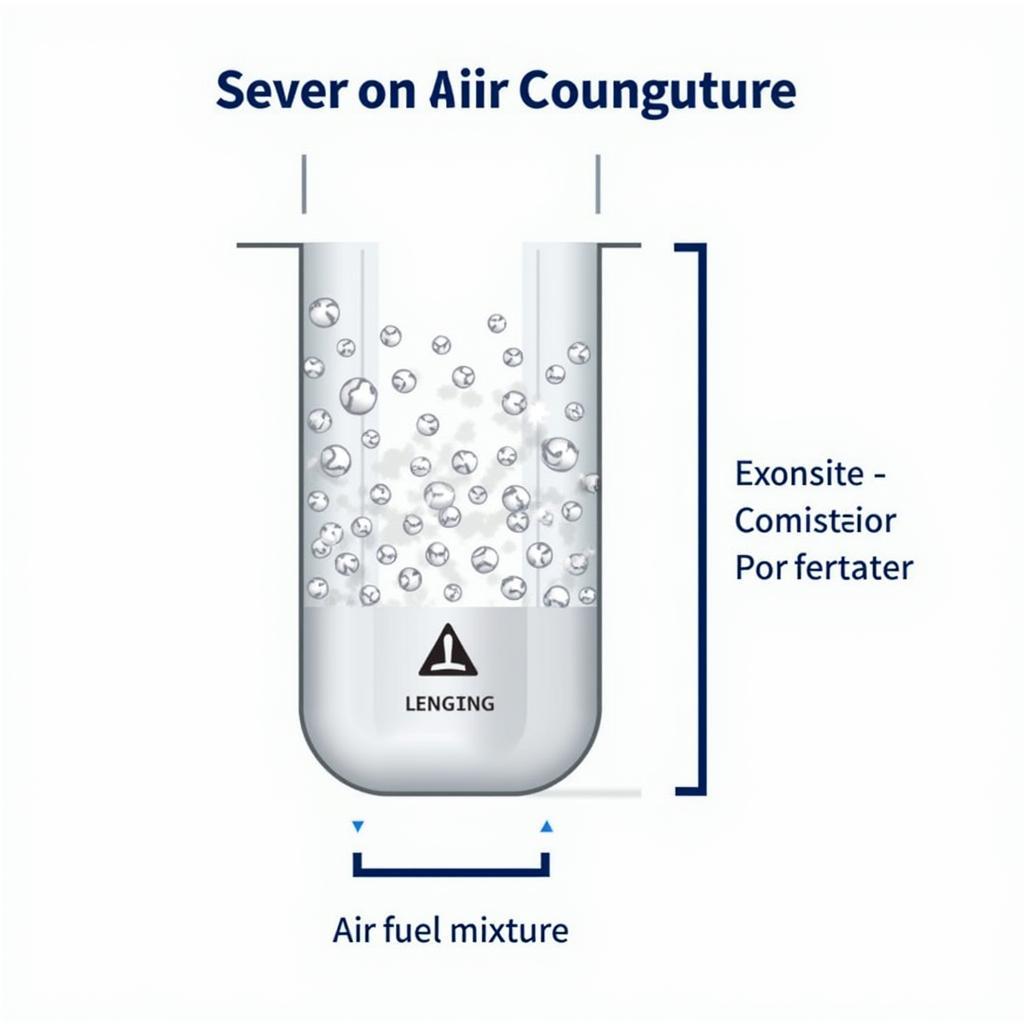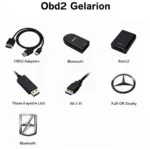The dreaded “Check Engine” light can turn even the most seasoned driver into a nervous wreck. When your car throws a P0171 code, it indicates a problem with your engine’s air-fuel mixture. Specifically, this OBD2 code signifies a “System Too Lean (Bank 1)”. While it might sound cryptic, understanding this code and its potential causes can save you time, money, and unnecessary stress.
Demystifying the P0171 Code: What Does “System Too Lean” Mean?
To run smoothly and efficiently, your engine needs a precise balance of air and fuel. This ratio is carefully controlled by your car’s computer, also known as the Engine Control Unit (ECU), using data from various sensors. A P0171 code means the ECU detects that there’s too much air compared to the amount of fuel entering the engine’s cylinders – a “lean” condition.
While a slightly lean mixture can improve fuel economy, a significantly lean condition can cause:
- Reduced Engine Performance: Lack of sufficient fuel can cause misfires, hesitation, and overall sluggishness.
- Increased Emissions: A lean mixture burns hotter and can damage your catalytic converter, leading to increased emissions.
- Engine Damage: In extreme cases, prolonged running with a lean mixture can lead to severe engine damage.
Unraveling the Culprit: Common Causes of OBD2 Code P0171
Several factors can trigger a P0171 code. Here’s a breakdown of the most common culprits:
1. Vacuum Leaks: The Silent Saboteurs
One of the most frequent causes of a P0171 code is a vacuum leak. Your engine relies on a sealed system to maintain the correct air-fuel ratio. A leak in the intake manifold, vacuum hoses, or other components can disrupt this balance, allowing unmetered air to enter the engine.
2. Oxygen Sensor Malfunction: The Misinformed Messenger
The oxygen sensor, also known as the O2 sensor, plays a crucial role in monitoring the air-fuel mixture. A faulty sensor can send inaccurate readings to the ECU, leading to an incorrect diagnosis of a lean condition.
3. Fuel System Issues: The Starved Engine
Problems with your fuel system can also contribute to a P0171 code. A clogged fuel filter, weak fuel pump, or malfunctioning fuel injectors can restrict fuel flow, leading to a lean mixture.
4. Mass Airflow Sensor (MAF) Problems: The Airflow Miscalculator
The MAF sensor measures the amount of air entering the engine. A dirty or faulty MAF sensor can send inaccurate readings to the ECU, causing it to miscalculate the required fuel amount.
5. Other Potential Culprits:
While less common, other potential causes of a P0171 code include:
- EVAP System Leak: A leak in the evaporative emissions control (EVAP) system can allow fuel vapors to escape, leading to a lean condition.
- PCV Valve Issues: A faulty positive crankcase ventilation (PCV) valve can disrupt the air-fuel mixture by allowing excess air into the intake manifold.
- Faulty Engine Coolant Temperature Sensor: This sensor helps the ECU determine the engine’s operating temperature, which influences the air-fuel mixture. A faulty sensor can provide inaccurate readings, leading to a lean condition.
Troubleshooting P0171: A Step-by-Step Guide
Diagnosing the exact cause of a P0171 code can sometimes be tricky, but following a systematic approach can help pinpoint the issue:
- Read and Clear the Code: Use an OBD2 scanner to read the code and clear it. This will help you determine if the code returns and if other codes are present.
- Inspect for Vacuum Leaks: Visually inspect vacuum hoses for cracks, loose connections, or damage. You can also use a carburetor cleaner to spray around suspected leak areas while the engine is running; a change in engine RPM indicates a leak.
- Check the Oxygen Sensors: Inspect the oxygen sensors for damage or excessive carbon buildup. A multimeter can be used to test their functionality.
- Examine the Fuel System: Check the fuel pressure, fuel filter, and fuel injectors. A fuel pressure gauge can help determine if the fuel pressure is within the manufacturer’s specifications.
- Inspect the MAF Sensor: Remove the MAF sensor and inspect it for dirt or debris. You can clean it with a specialized MAF sensor cleaner.
- Consider Other Possibilities: If the above steps don’t reveal the culprit, consider inspecting the EVAP system, PCV valve, and engine coolant temperature sensor.
Expert Insights:
John Smith, Certified Master Automotive Technician, says: “Many car owners underestimate the importance of regular maintenance. A simple task like replacing your air filter can prevent a whole host of problems, including those that trigger a P0171 code.”
Addressing the P0171 Code: The Importance of Proper Diagnosis
While this guide provides valuable insights into the P0171 code, it’s crucial to remember that accurately diagnosing and repairing engine problems often requires specialized knowledge and tools. If you’re uncomfortable tackling this issue yourself, seeking assistance from a qualified mechanic is always recommended.
Conclusion: Don’t Ignore the Warning Signs
A P0171 code, while common, shouldn’t be ignored. Addressing the underlying cause promptly can save you from costly repairs and ensure your vehicle’s optimal performance. By understanding this code and following the troubleshooting steps outlined above, you can take charge of your car’s health and get back on the road with confidence.
Frequently Asked Questions about the P0171 Code:
- Can I drive my car with a P0171 code? It’s not advisable to drive for extended periods with a P0171 code, as it can lead to further engine damage.
- How much does it cost to fix a P0171 code? The cost of repair varies widely depending on the underlying cause, ranging from a simple DIY fix to a more expensive repair.
- Will a P0171 code clear itself? While the code might temporarily disappear, the underlying problem will persist and likely trigger the code again.
- Can a bad gas cap cause a P0171 code? While less likely, a loose or damaged gas cap can sometimes contribute to a lean condition, triggering a P0171 code.
- What is the difference between a P0171 and a P0174 code? Both codes indicate a lean condition, but P0171 refers to Bank 1, while P0174 refers to Bank 2 (engines with two cylinder banks).
Need further assistance?
Contact us via WhatsApp: +1(641)206-8880 or Email: [email protected]. Our 24/7 customer support team is ready to help!
For more information on OBD2 codes and how to use an OBD2 Ford Mondeo Mk4, visit our website OBDFree. You can also find valuable resources on specific car models, such as OBD2 Mondeo Mk4 and Bluedriver OBD2 Scan Tool 2014 Genesis. We also have articles on specific brands like Polestar OBD2 and códigos de falla obd2 volkswagen.


